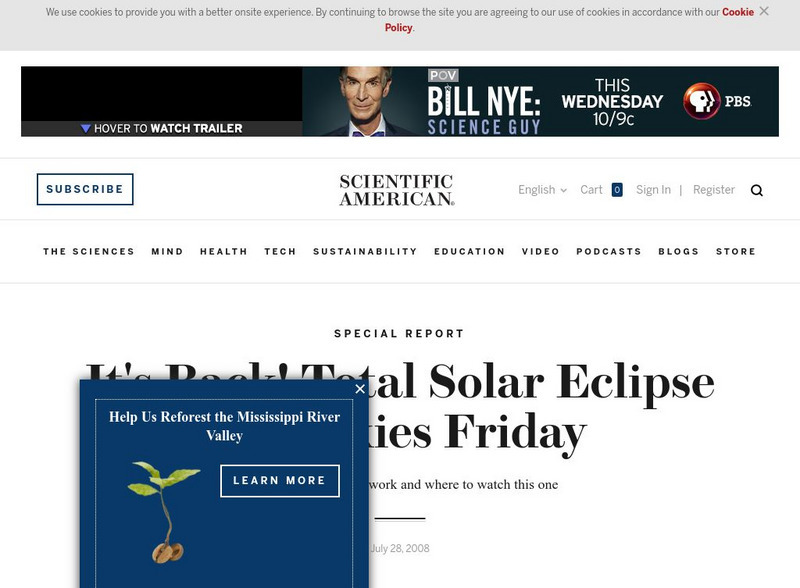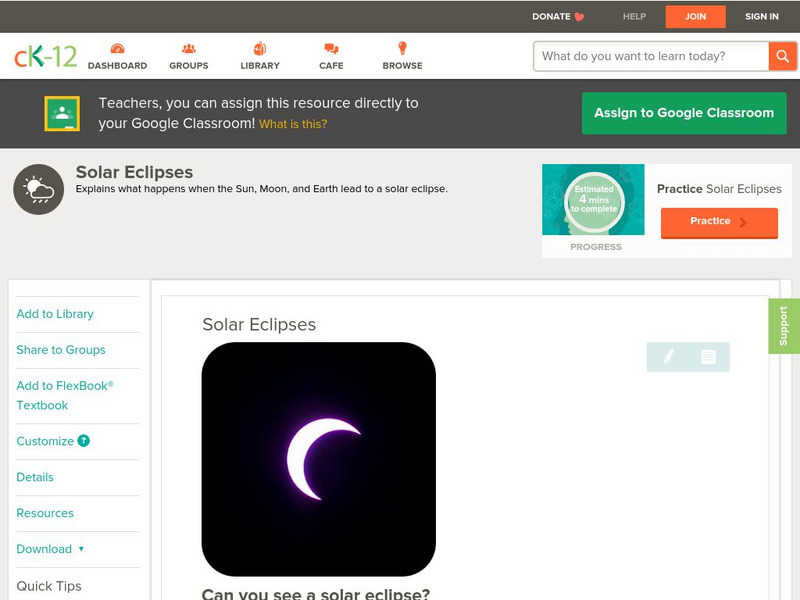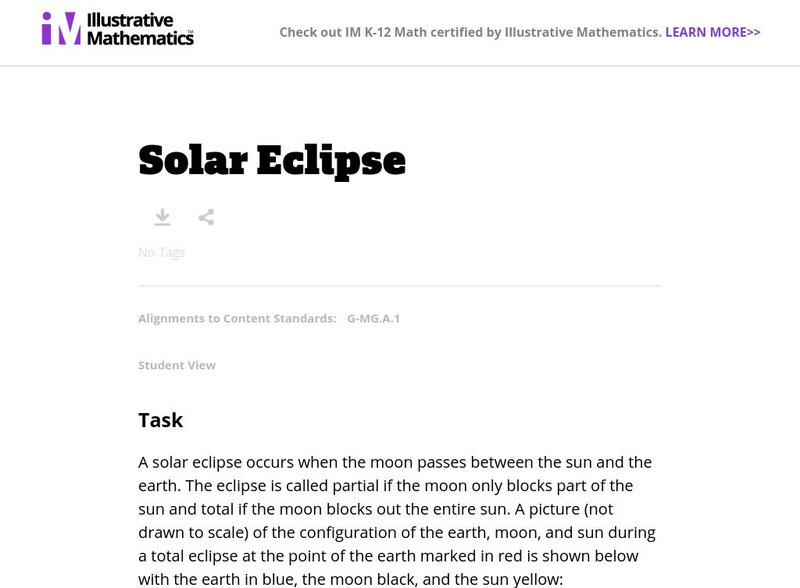Hi, what do you want to do?
Exploratorium
Exploratorium: Total Solar Eclipse
This site provides detailed information about solar eclipses, including what to watch for and how to view an eclipse, why an eclipse occurs, and various feature stories.
National Geographic
National Geographic: Build a Solar Eclipse Viewer
This lesson focuses on How can you safely view a solar eclipse and solar activity? It provides step-by-step instructions for building the viewer and how to use it properly. It also provides a video and informational slides.
PBS
Pbs Learning Media: Total Solar Eclipse Animation
This brief animation adapted from NOVA illustrates how total solar eclipses form and explains the stages from first contact to totality. [1:14]
Scientific American
Scientific American: It's Back! Total Solar Eclipse Hits Skies
Discover information about the solar eclipse of the moon cutting between the Earth and the Sun in July 2008. [July 2008]
CK-12 Foundation
Ck 12: Earth Science: Solar Eclipses
[Free Registration/Login may be required to access all resource tools.] Find out how solar eclipses occur.
University Corporation for Atmospheric Research
Ucar: Solar Eclipse Memory Game
Test your memory while you learn about eclipses of the Sun. Click on tiles to reveal pictures of solar eclipses and maps of the path of the November 2012 eclipse in Australia. Try to find matching pairs of pictures.
University Corporation for Atmospheric Research
Ucar: Compare Solar Eclipse Photos
Compares photos of different solar eclipses side-by-side.
Exploratorium
Exploratorium: Total Solar Eclipse July 22, 2009
Watch webcast coverage of a total eclipse of the sun. Slideshows and animations explain how this exceptional space event takes place.
NASA
Nasa: Central Solar Eclipse Paths: 1991 2050
Resource provides links to maps and path coordinates for every solar eclipse from 1991 through 2050.
NASA
Nasa: Eye Safety During Solar Eclipses
This resource, which is provided for by NASA, gives great information on protecting your eyes during solar eclipses. Your eyes are very difficult to replace. Even when 99% of the Sun's surface is obscured during the partial phases of a...
Merriam-Webster
Merriam Webster: Dictionary Illustration: Solar Eclipse
Basic diagram of a solar eclipse illustrates the relative positions of the sun, moon, and earth.
Other
The Total Solar Eclipse Described by Plutarch Pdf [Pdf]
An exploration of the total eclipse of the sun described by Plutarch in his DE FACIE IN ORBE LUNAE. Requires Adobe Reader.
Illustrative Mathematics
Illustrative Mathematics: G Mg Solar Eclipse
In this task, students investigate why total solar eclipses are rare. They will learn that, in addition to requiring the positioning of the Sun, Moon, and Earth, the Moon can only completely block out the Sun when it is closest to the...
Ducksters
Ducksters: Astronomy for Kids: Lunar and Solar Eclipses
Kids learn about lunar and solar eclipses in the science of astronomy including the umbra, antumbra, penumbra shadows as well as total, partial, and annular.
NASA
Nasa: Solar and Lunar Eclipses
Information on solar and lunar eclipses for current year as well as past and future.
CommonLit
Common Lit: "What Is an Eclipse?" by Nasa
CommonLit.org is a wonderful resource to use in a Language Arts classroom. Each story or article is accompanied by guided reading questions, assessment questions, and discussion questions. In addition, students can click on words to see...
Sophia Learning
Sophia: Eclipses
A introductory lesson explaining the differences between lunar and solar eclipses.
American Association of Physics Teachers
Com Padre Digital Library: Open Source Physics: Solar and Lunar Eclipse Model
Experience the simulation of both solar and lunar eclipses to understand why these eclipses do not occur monthly.
NASA
The Solar Data Analysis Center (Sdac)
The Solar Data Analysis Center at NASA provides all the latest information learned about the sun. Content includes a look at information brought back by several satellites.
TED Talks
Ted: Ted Ed: A Rare, Spectacular Total Eclipse of the Sun
Andy Cohen details the extraordinary celestial phenomenon of a total solar eclipse, and when it will next occur. [3:47]
California Academy of Sciences
California Academy of Sciences: Viewing a Solar Eclipse
Make sure you know how to view a solar eclipse safely! Includes the history and science behind solar eclipses.
Science Fun for Everyone
Science Fun: Solar Eclipse Kit
Create your own solar eclipse with this science experiment. *This experiment is not to be used to look at the actual sun. Looking directly at the sun can be harmful.*
Exploratorium
Exploratorium: Eclipse 2001 the View From Zambia
On Thursday, June 21, 2001, a total solar eclipse sped across the Southern Hemisphere, and this site has highlights of the eclipse captured on tape.
Other popular searches
- Solar Eclipse Demonstration
- Classroom Solar Eclipse
- Solar Eclipse Activity
- Lunar and Solar Eclipses
- Review Solar Eclipse
- Partial Solar Eclipse
- Solar Eclipse Stories
- Solar Eclipse Worksheet
- Stained Glass Solar Eclipse
- Solar Eclipse Art
- Lunar v. Solar Eclipse
- Science Solar Eclipses





















